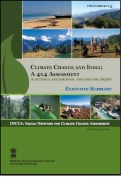 This report prepared by the Indian Network for Climate Change Assessment (INCCA) provides an assessment of impact of climate change in 2030s on four key sectors of the Indian economy, namely agriculture, water, natural ecosystems & biodiversity and health in four climate sensitive regions of India, namely the Himalayan region, the Western Ghats, the Coastal Area and the North-East Region. This is the for the first time that such a comprehensive, long term assessment has been undertaken based on rigorous scientific analysis for the 2030s (all previous assessments were for the 2070s and beyond).
This report prepared by the Indian Network for Climate Change Assessment (INCCA) provides an assessment of impact of climate change in 2030s on four key sectors of the Indian economy, namely agriculture, water, natural ecosystems & biodiversity and health in four climate sensitive regions of India, namely the Himalayan region, the Western Ghats, the Coastal Area and the North-East Region. This is the for the first time that such a comprehensive, long term assessment has been undertaken based on rigorous scientific analysis for the 2030s (all previous assessments were for the 2070s and beyond).
Recent evidence suggests the scientific consensus on the impact of climate change on our glaciers, on our monsoons, and indeed even on sea level rise is debatable. Rigorous science based assessments are therefore critical in designing India’s adaptation strategies given that it is exposed to climate change on multiple fronts. The assessment builds on our own independent and credible research capacity on these issues.
In particular, the knowledge and understanding of impacts as deduced from the Global Circulation Models and Regional Climate Models are not adequate to assess the impacts and implications for India. This assessment is an attempt to use PRECIS (Providing Climate Investigation Studies) based on HadRM (Hadley Regional Climate Model) to generate climate change scenario for 2030s.
The report specifically attempts to -
- Assess the drivers and implications of climate change through scientific research
- Prepare climate change assessments once every two years (GHG estimations and impacts of climate change, associated vulnerabilities and adaptation)
- Develop decision support systems
- Build capacity towards management of climate change related risks and opportunities
It has been organized into nine chapters, namely, (1) Context; (2) The key sectors and regions; (3) The observed climate and climate change projections; (4) Observed sea-level rise, extreme events and future projections; and then impacts of climate change on (5) Agriculture; (6) Natural ecosystems and biodiversity; (7) Human health; (8) Water and the last chapter deals with the (9) Salient findings, challenges of the assessment and way forward.
The section on salient findings, challenges of the assessment and way forward deals with the following -
- Synthesizes the salient findings emerging from the earlier chapters that highlight the impacts of climate change in 2030’s.
- Discusses the challenges, data gaps and uncertainties associated with the modeling aspects of the assessment.
- Subsequently, discusses the way forward to make the assessments more scientifically rigorous and relevant to policy making.
- Suggests undertaking further assessments at all the climatic zones and at state levels to bridge the gap between policy and science.
Download the report here: